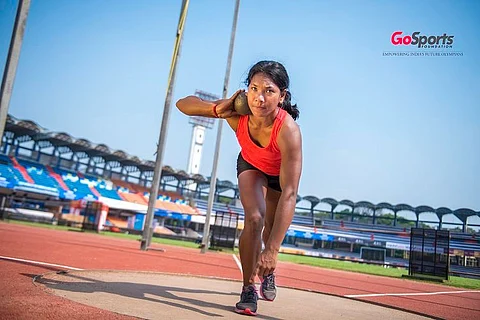

As Budhia's story comes to the big screen with "Budhia Singh: Born to Run", we take a look at the young runner's life, and that of a few other athletes who hope to represent the country's hopes for sporting success.
When she was growing up, every time heptathlete Swapna Barman would train for long hours in the sun, people in her village would warn her to stay home instead or her skin would turn dark.
“They even went to the extent of saying I wouldn’t find anybody to marry but all that has not deterred me from focusing on sport. Because of sport, I have made it this far and I hope to go even further,” she says.
The 19-year-old’s foray into the world of sports happened, as she puts it, by chance.
Swapna had a very modest upbringing in a small village in West Bengal's Jalpaiguri. Her father was a rickshaw puller, her mother worked at a tea garden and her brother ran a small business and sold wood in the village.
She started participating in sports – mainly high-jump, long jump, football and gymnastics – when she was in Class 4. She was spotted by one of the students of her current coach, Subash Sarkar, who put in a recommendation for her with the coach.
That recommendation and a new record set at a National Meet, saw Swapna relocating to the Sports Authority of India, Kolkata.
Moving to SAI, she says was one of the defining moments of her life. It not only gave her exposure and widened her horizons, it also made her realise that it is possible for women to pursue sports as a full-time career.
"The immediate benefit was that my living and training expenses were taken care of, which was a huge burden off my family’s shoulders," she says.
It was also at SAI that she was advised to shift from high jump to heptathlon – a combined event which consists of seven track and field events.
Making her mark
Swapna took part in the 2013 Junior Nationals in Chennai and bagged a gold medal in heptathlon and high jump with new national records.
At 17, she represented India in the 2014 Asian Games and finished fifth. She then went on to win a gold medal in heptathlon and a silver in high jump at the 2015 National Games in Kerala.
"Whatever I have achieved today is because of my coach. His vision and guidance have played a key role in shaping my career," says Swapna.
Challenges
One of the main obstacles that has stood in Swapna’s way is a special condition she was born with – she has 6 toes on each foot – which puts her in severe pain and discomfort whenever she competes.
"I have been competing with a lot of pain physically. The width of the shoes has an impact on how my foot lands and the lack of expansion around the edges results in discomfort. I have tried multiple brands but unfortunately my condition is unique and none of the shoes are customized for something like this. Apart from the pain, of course, the shoes themselves don’t last long," she explains.
But her goal to become a "champion athlete" drives her to perform in-spite of the hurdles she faces.
Her father who suffered a stroke in 2013 is bed-ridden and her mother quit her job in the tea garden to take care of him.
"I will not hide the fact that sport is also an avenue for me to provide for me and my family. If I was not pursuing sports, I would probably have been forced into marriage in my village by now, as all girls my age are," says the teenager adding that her family has been very supportive and encouraging of her passion.
Sports in India
As grateful as Swapna is to her experiences at SAI, she feels that the sports system in India has a long way to go to catch up to the leading nations. One of the main elements that could drastically change how Indian athletes perform globally is the increased application of modern sports science techniques, which is widely prevalent in leading nations, she explains.
In her own case, she explains, while she has had access to basic training amenities at SAI, it is only very recently that she has been able to experience wider applications of sports science. “GoSports Foundation, a non-profit organisation working towards the development of Indian athletes, has been supporting me since 2015 and through them I underwent comprehensive sport science assessments and was given access to sports nutritionists and injury management experts,” she says.
And this experience has opened her eyes to the vast difference that a more informed and scientific approach can make to athletes’ performances.
Swapna aims to win a gold medal at the 2018 Asian Games and is also preparing for the 2020 Tokyo Olympics.
As someone who has never considered her socio-economic background as a limitation to achieving success, she’s eager to urge other budding athletes from similar backgrounds never to give up. "If you are certain of your goal and what you want to achieve, then you should let no one else get in the way of your decision."
(This interview was carried out with the assistance of GoSports Foundation. The non-profit trust currently supports 50 athletes, mainly under the Rahul Dravid Athlete Mentorship Programme and the Para Champions Programme. Apart from this, they also have Shooting and Badminton Scholarships under which they support some of the next generation of India's top talents.)
Also read: